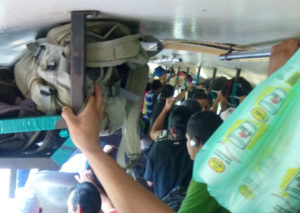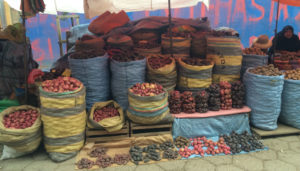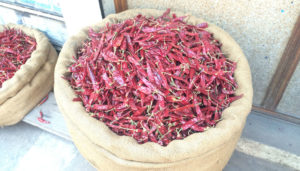10 WAYS TO SAVE MONEY TRAVELING THE WORLD
Have you ever wondered what it would be like to go on a 6 month backpacking trip across Asia or Europe? If you made your way to this site, there is a good chance you have. Before I myself began to take extended trips, I used to wonder how people could afford to travel months on end. And we all wonder how can these people just pack up and travel for 6 months to a year. Where do they get the money? How do they do it? Did they win a lottery? Did they get a large inheritance? Did they rob a bank?
Hello, everybody! Thanks for stopping in and welcome to my first travel blog post! My name is Tyler and I have been doing these types of long backpacking trips for over 16 years. I am always asked the same questions that I mentioned above. And no I definitely did not win the lottery, get an inheritance, or rob a bank. I do still work for 6-7 months of the year as a seasonal worker in the construction industry. Along with that, I budget my money with traveling in mind during my time at home in Canada.
You must stay focused on your goal to save money in order to fulfill your passion for traveling. The number one question I get is “How can you afford to travel for so long?” The most important thing that will allow me to do this is my lifestyle and how I can save money. Here are a few of my tips;
My top 10 money saving tips that allow me to travel for 5 months a year
#1. Live somewhat frugal when you are working and saving up in your own country
During my time working in Canada, I try not to spend my money on temptations like the new clothes, a fancy vehicle or going out for food and drinks at nice places. If you really want to go on a long trip, you must keep that goal in mind and stay focused on saving all the time. When you finally get to go on your trip, you will be happy that you did it.
If you go to a developing country you will see that your money will go so much further on daily expenses. For example, if you go out for food and drinks somewhere in South American or South East Asia, it may only cost you a fraction of the price of what you would pay at home. You may pay $5 for a meal that would cost you $20 in your own country.
#2. Try to find a job that will allow you to make overtime or tips in a short period of time.
Most of the jobs I had in the past 15 years were seasonal or labor jobs that always allowed me to work overtime. My current job is driving a concrete mixer truck in for the construction industry. This job allows me to work 50-70 hours a week, therefore I can save more money in a shorter period of time with all the overtime. Plus I get a lot of money back at income tax time because I only work half of the year. I get approximately 1 months take home earning back at tax time.
During the 7 months working in Canada I am very tired from the long hours and really have no life other than eat, sleep, work, repeat. However, I always have the comfort of knowing that I will be soon laying on a nice beach, hiking in the pristine mountains, or better yet sleeping in any day I want for 5 months. The small sacrifices made at home are outweighed by the rewards of when I’m abroad.
Some long term backpackers have told me that working in bars, restaurants, and the field are great ways to save money in a short time.
#3. Plan your destination to a developing area of the world.
For example, a trip to South East Asia, or Central America is much more affordable than a trip to Europe, or Australia. I also find that developing countries seem to be more of an adventure, as you just never know what’s around the next corner. For example in Central America you could be in a new luxurious hostel one minute, then on a 40 seat “chicken bus” loaded up with over 200 people the next minute.

#4. Stay in hostels instead of hotels whenever possible.
Hostels are not only cheap, but it’s a great way to meet new people doing exactly what you are doing. Typically a dorm bed will cost between $8-$15 US dollars in most developing countries. You can often learn a lot of different ways of saving money from other travelers that you meet at the hostels. For example, you may discover a cheaper way to see a site or get to a destination, as other travelers are often your best resource for money-saving tips.
Hostels usually have free wifi that may be somewhat more reliable than the internet at coffee shops and restaurants, and you often have access to cooking facilities which helps support my #5 tip.
#5. Buy grocery’s from the markets and cook your own food. Or buy cooked food from the street vendors.


The local markets are cheap and often have fresh organic vegetables and local fruit. My first time in Thailand I was scared to buy cooked food from the street vendors. But then I realized something very obvious; you can see the street vendors prepare and cook the food before your very own eyes. But in a restaurant, you have no idea what is going on in the kitchen!
For only a couple of dollars, you can get some pretty amazing food in Thailand. A tip that is pretty reliable anywhere regarding street food; if there is a long line of locals waiting to get served, then you can rest assure that the food is safe, cheap, and good.

#6. Take an overnight bus or train and save on a nights accommodation.

You can often get a night bus or train if you are traveling between popular destinations. Although it may be hard to sleep in a seat, you will save some money on a night’s accommodation.
Plus, night transportation is usually direct if you are traveling between two main destinations. This means that you will not have to switch buses or trains during the journey. A lot of buses in South America, India, and Asia offer half sleepers, and sometimes full-length beds on night buses.
#7. Never buy pre-paid package tours from your own country before your trip.
Everybody kind of likes things all planned out for them. And you can travel with everything planned out for you on a tour, but it does cost a lot more money and it is a totally different kind of travel adventure. There is nothing wrong with buying a day tour or a 3 or 4-day hiking tour package. But I strongly suggest that you buy these type of packages in the town or village closest to the tour’s starting point.
I often hear the horror stories of people paying $3000 to $4000 to buy into a pre-paid package tour before leaving home only to find out that the majority of people on the tour bought their ticket at the town where the tours started and paid a tenth of the price.
Most tourist towns have tons of competition, so prices are often reasonable for day trips and package tours. Internet reviews and other backpackers are your best resources. I usually book my tours through the hostel I’m staying at. One- it helps support the hostel, and two- the hostel owners know that if your tour is not good then they are certainly going to hear about it!
#8. Always try to bargain if you are traveling in a developing country.
You can usually bargain for almost anything. Taxis, tuk-tuks, tours, souvenirs, and food. A lot of hotels and hostels will give you a better deal if you stay 2-3 nights or even more if you stay for a week or a month so don’t be afraid to ask.
Please keep in mind when bargaining for handicrafts and other hand-made stuff that If you think that the seller spent a lot of time making something, please give them a fair price. It can be a lot of fun bargaining for stuff, but please consider that the seller does rely on your purchase to support their livelihood.
#9. Volunteer at a hostel in exchange for free accommodation and meals.
Most hostels offer backpackers an opportunity to volunteer in exchange for free accommodation and sometimes even some meals if the hostel has a restaurant. The work could range from cleaning up rooms, working reception to working in the hostel bar or restaurant if they have one. I have never done this, but I have been told by many backpackers that it is a great way to get to know a city or area.
#10. Buy a return flight if you have an idea of when and where you will return from.
It’s not always worth it, but sometimes if you buy a return ticket the price can be up to 50% less. For example last year I needed to fly from Brasil to Canada. The price was $1200 one way. I clicked on return and the price dropped to $330 dollars. I did a lot of searching and found that if I booked a flight to Chile for my return portion it was only $220. This ticket was spaced 7 months. Now I have a one-way ticket to my next trip. Even if I didn’t take the trip to Chile the flight back to Canada was less than half of the original one-way option.
There was a sale on when I booked this so the difference is not usually that dramatic. But you can sometimes save up to 40-50% if you get a return. However, it is not always convenient.
Well, I hope this answers some questions about how people can afford to travel for long periods of time. Please feel free to e-mail me info@travelcanbecheap.com or ask me some travel questions in the comment space bellow. I look forward to hearing from you and I hope you sign up to my newsletter so that you can keep up to date on my latest travel tips.
Thanks for dropping by! Tyler England



November 17, 2016 @ 8:45 am
This is great Tyler! I have always lived vicariously through you! Safe travels buddy
~Nikki~
November 17, 2016 @ 4:27 pm
Thanks Nikki! It’s always great to hear from you during my travels.
November 20, 2016 @ 9:30 am
Espectacular! me siento muy feliz de conocerte! y leer de tus experiencias! espero sigas viajando!! tomare tips porque me gusta esta idea de viajar de mochila 😉
November 20, 2016 @ 8:15 pm
Gracias Gaby! Mochilero es divertido. 🙂